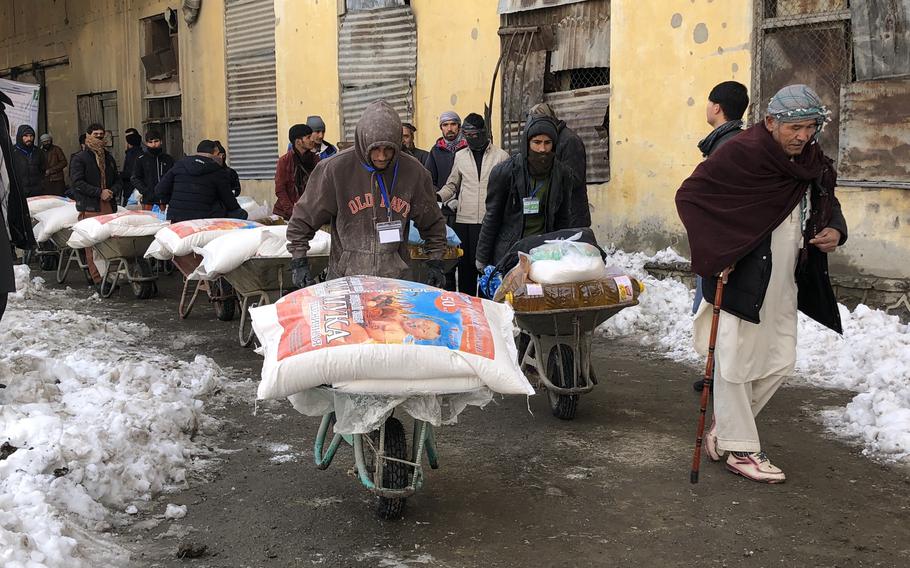
Mahmad Ali, a disabled war veteran, slowly accompanies the wheelbarrow of donated food he has just received in Kabul on Jan. 4, 2022. (Pamela Constable/The Washington Post )
The United Nations on Tuesday launched a funding appeal for more than $5 billion for Afghanistan this year, its largest request ever for a single country in humanitarian distress.
"This is a stopgap, an absolutely essential stopgap measure that we are putting in front of the international community today," U.N. Emergency Relief Coordinator Martin Griffiths said in announcing the appeal in Geneva. "Without this being funded, there won't be a future" for Afghanistan.
The money, Griffiths said, is both to fund direct humanitarian assistance to tens of millions of Afghans now facing "acute" food insecurity and needing shelter from the harsh winter, and to directly pay health-care workers and others who have received no salaries for most of the past year.
In response to the appeal, the U.S. Agency for International Development announced an initial 2022 contribution of more than $308 million in assistance.
The appeal comes as the international community continues to grapple with how to avoid humanitarian disaster in Afghanistan without benefiting the Taliban rulers who gained control of the country and government in August.
Before the militant takeover, international funds, primarily from the United States, provided more than 75% of Afghanistan's income. That funding stopped abruptly following the U.S. military evacuation and fall of the U.S.-backed government. The United States, which also holds the bulk of about $10 billion in reserves owned by Afghanistan's central bank, also has refused to allow any access to that money.
The Taliban, and many of its leaders now in high government positions, remains under heavy U.S. and international sanctions that prohibit any financial dealing with it. The Biden administration has said those sanctions will not be lifted until the militants meet commitments including the formation of an inclusive government and full rights for all citizens, including women and minorities.
Over the past several months, there has been some flexibility, including Treasury Department waivers and a U.S.-sponsored U.N. resolution allowing aid funds to flow, along with direct cash payments to some Afghan public-sector workers, including in health care and education.
But Griffiths and other U.N. officials said Tuesday that the ongoing lack of liquidity - or cash - in the Afghan economy and the collapse of the banking sector still pose grave problems.
"There has been a great deal of discussion and preparation for how to mitigate the economic collapse, but we still do not have a functioning central bank, we still have frozen assets . . . we still don't have the liquidity . . . needed for humanitarian operations, let alone trade and business," Griffiths said.
"Work is being done, but we need to see the shoe hit the ground," said Griffiths, who will meet this week with administration officials in Washington.
An earlier appeal for hundreds of millions of dollars in emergency humanitarian aid was more than fully funded. But the new request comes as the Taliban has dragged its feet in providing rights for women in education and the workplace, and amid continued sporadic reports of reprisals - including summary executions - against perceived enemies.
About $4.4 billion of the new appeal is to be spent inside Afghanistan, where economic collapse, along with prolonged drought and the effects of the coronavirus pandemic, has left more than half the population of 40 million in acute need.
The rest is directed toward countries along its borders - primarily Iran and Pakistan - that are hosting millions of Afghan refugees who fled the country both before and after the Taliban takeover.
While some are concerned about security, "the vast majority of people are not going back because they don't have basic services" and ways to make a living, U.N. High Commissioner for Refugees Filippo Grandi said at the Geneva news conference.
If that problem is not solved, he said, more refugees can be expected, with spillover into Europe and beyond.